Everything About Growing Organic Vegetables in Backyard and Garden
There is nothing more satisfying than cultivating greenery in the vicinity of your backyard, but what’s more miraculous is witnessing the process of growing organic vegetables close to your home. Regardless of your diet, veggies are an integral part of our meals, and there’s nothing better than growing them yourself.
Also, once you start growing organic vegetables at home, you will be more conscious and grateful for them, becoming more mindful through the therapeutic art of gardening. Let’s sharpen our minds on how to grow organic vegetables at home in the most natural way possible!
What Is Meant By Organic Gardening?
Organic gardening is cultivating rich greenery without using chemicals like pesticides, chemical fertilizers, etc. When one treats the greenery in an environment-friendly manner, it tends to give back in bounty - the yield is much more nourished and healthy than otherwise. Further, using organic means for gardening also benefits the ecosystem in the long run.
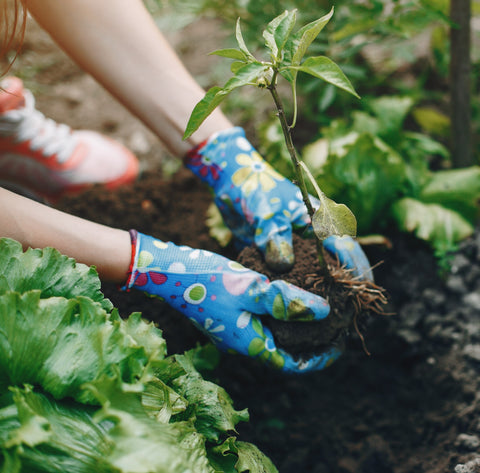
What Are The Standard Organic Gardening Principles?
While not using chemicals is a fundamental principle attached to organic farming, there are several ways to train your garden organically. Keep reading to learn organic vegetables growing tips that will assist you in cultivating a healthy garden with a rich yield.
-
Composting
As we can’t use chemicals to enrich the soil composition, the process of composting lends us the opportunity to do the same by recycling organic matter like eggshells, coffee grinds, banana peels, etc. Some gardeners use composting bins to go through this process, but one can do it without them. Once you mix the plant soil with compost, it will change for the better.
-
Mulching
It is the act of spreading the ground with mulch like grass clippings, leaves, pine straws, wood shavings, etc. Two things happen when you cover the soil with the mulch - first, it blocks the sun’s rays from reaching weeds, thus, halting their growth. Secondly, it will improve the soil’s moisture retention while pumping essential nutrients.
-
Optimum Hydration
The biggest trick of gardening is perhaps the correct time and volume of water to be poured, as both over and underwatering will lead to the plant’s decay. It is essential to water them in a sustainable manner only when the soil seems dry at the touch. A drip irrigation system is an excellent way to keep your plants optimally hydrated.
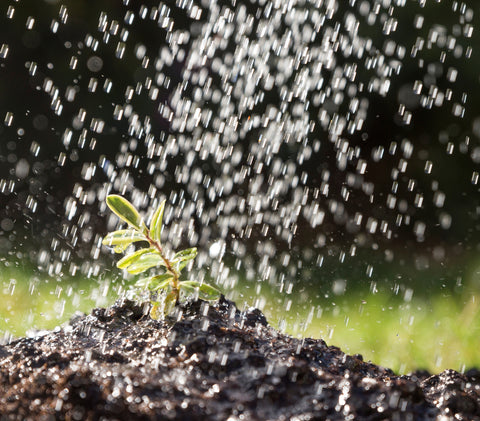
-
Pest Protection
Just because it is organic does not mean it won’t attract insects, and our rule for organic gardening says we can’t use chemicals, so we would rather use natural pesticides for plant, like neem oil, insecticidal soaps, etc. These natural pesticides work wonders to maintain the sanity of the organic yield. Also, try precautions like not watering the leaves as it will attract insects and diseases. Two forms of gardening will allow you to gain more control over these nasty pests:
A. Crop Rotation
As the name suggests, crop rotation is basically rotating the crops cultivated at one location. Changing the propagation location and growing different crops in one place maintains the soil’s nutrients while keeping the insects at bay.
B. Companion Planting
This plantation is based on allotting a companion to the plants that will benefit them. It’s basically assigning the best friends to your organic vegetables in the form of other greenery with an innate capability to repel insects.
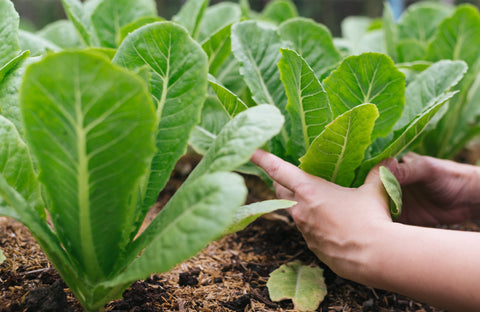
A Step-By-Step Approach To Growing Organic Vegetables:
-
Climatic Conditions
One of the most neglected organic vegetables tips is understanding the vegetables’ preferred climate. We know how exciting the prospect of growing veggies at home is, but this doesn’t mean you can grow any vegetable you can think of. It is essential to gauge whether the chosen vegetables will acclimatize to the local climate.
-
Shop Some Seeds
Once you know which veggies will flourish in your region, pick your smart device to order some vegetable seeds from the online market. You can also go for a vegetable growing kit if you are a beginner who wishes to keep things slow. Ensure you look for the organic tag on the packets and buy them from an authentic store like ours.
-
Sunshine Is A Must
One crucial point to consider before sowing the seeds is choosing the spot for plantations. Organic gardening at home demands full-sun exposure until & unless you live in an intensely hot part of the globe. Your organic garden should receive a minimum of six hours of sunshine and partial shade if the area burns with the sun’s rage.
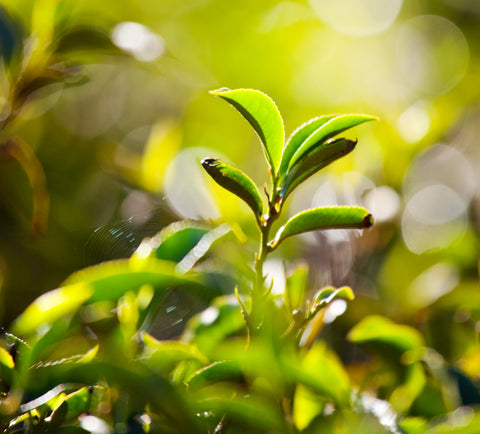
-
Water Soaks Or Pools?
Before propagating, test the soil’s drainage by intentionally pouring ample water using a gardening hose. You must work on the drainage if the water stands in the earth. However, if the ground soaks the water, you are good to go. Proper drainage is vital for healthy plant growth.
-
Soil pH And Quality
Veggies best grow in soils with a pH level ranging from 5.5 to 7. If your lawn’s earth has a pH less than five, feed it with quicklime to increase the numbers. If you wish to decrease the pH level, treat it with organic matter like compost, garden manure, etc. You can mix the potting soil with magical gardening products like cocopeat & coco chips, peat moss, etc., to boost its nutritional quota.
-
Till The Soil
After the propagation spot, soil quality, and pH are all in check, till the ground using a hoe to break any lumps and remove unwanted growths. Also, remove any garden stones & pebbles hidden in the soil manually. This will assist the seeds to make robust root systems and the soil to drain better.
-
Sow The Seeds
After you ascertain the soil’s quality, making it more welcoming for the veggies, it’s finally time to bury the organic vegetable seeds into the ground. Start by sprinkling a handful of seeds over the ground, topping it with more soil afterward. However, if you are beginning with seedlings, dig a hole two to three inches deep to make room for their roots, ensuring they are not too tightly packed.
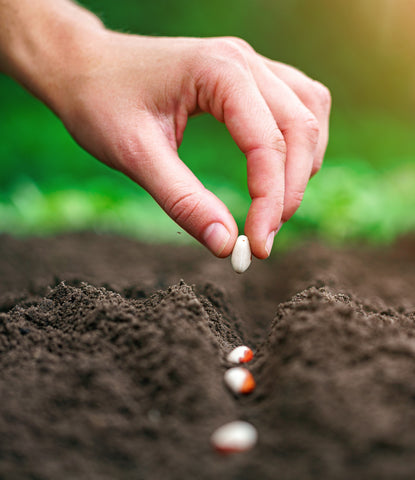
-
Immediate Hydration
Whether you have sown the seeds or the seedlings, ensure hydrating the soil generously right after the sowing process ends. Pour enough water using a watering can, spray bottle, or garden hose that builds moisture in the ground without making it soggy.
Caring Tips For Your Organic Vegetables Garden:
After the sowing process is complete, we want our organic greenery to flourish in the best possible way. To ensure that, one needs to provide ample care, attention, and love to the vegetable plants, as follows:
-
Timely Watering
All plants look for a moist environment from the beginning till the end; exceptions are always there. According to the organic vegetables guide, the ideal time to water your vegetable plants is in the morning if the soil seems dry. Early hydration leaves space for the sun to absorb excess moisture, if any. Also, you could restrict watering if the weather is rainy.
-
Feed Organic
Treat your veggie plantations with organic fertilizer, readily available at online gardening stores. Follow the instructions on the package and spray your plants with the nutrient-rich solution. You can also replace the regular water with this nutritious solution once a week to amp up their well-being.
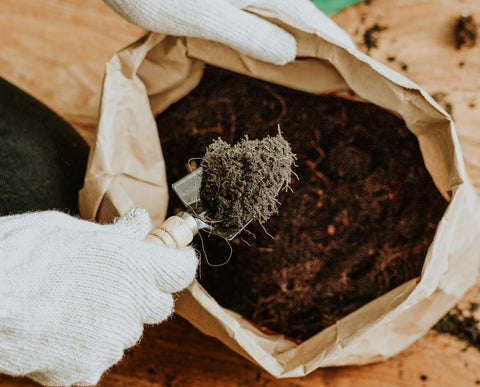
-
Remove Unwanted Growths
When we profess our love to the plants, certain unwanted growths tend to steal some of it, too. Therefore, it becomes a necessity to check for any weeds and ensure you remove them the first sight of their appearance. Neglecting these growths might hamper your plant’s health ultimately.
-
Welcome Helping Insects
This might sound weird if you are a beginner gardener, but several insects are a gardener’s friend, as they act like a blockage to the ones that can hamper the greenery. Plants like sunflowers, daisies, marigolds, etc., summon helpful insects like ladybugs, who will make a meal of the nasty pests and save your organic vegetables.
-
Chemical-Free Gardening
Remember the first rule of the organic vegetables process? It is to keep the chemical-infused products like fertilizers, pesticides, herbicides, etc., miles away from the organic garden. The prospect of using them might entice you, but you need to trust the natural means of producing vegetable crops.
How To Grow Organic Vegetables In Pots?
Not sure if you can pull off a whole backyard garden filled with organic veggies, or do you just wish to take tiny steps towards growing an organic garden? We got you, as you can also propagate the vegetable seeds or seedlings in the vegetable planters.
Choose medium-sized containers having at least ten to twelve inches and layer them with an organic potting mix filled with the richness of manure, compost, cocopeat, etc. Don’t forget to break any lumps in the soil while pouring into the pots. Also, an essential point about container gardening is that the planters should possess drainage holes to properly pass moisture.
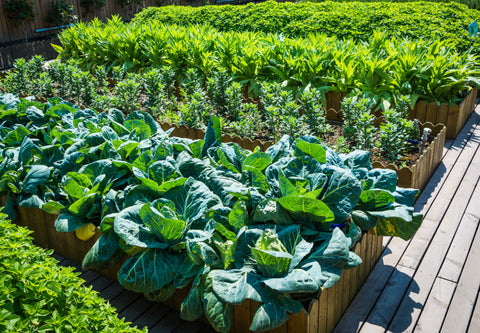
The rest of the steps are similar to what we have discussed before. However, an innovative and knowledgeable way of gardening suggests using plant name tags to let you identify the vegetables before you can see them sprouting.
Ideal Vegetables To Grow Organically In India:
-
Tomato
One of the most commonly grown vegetables in the home garden, the tomato actually falls in the fruits category. This savory fruit requires an ideal pH ranging somewhere between six to seven. Also, keep it in a shaded spot till it grows up to seven inches, after which you can shift it to a full-sun location receiving at least six hours of the sun’s warmth.
-
Bitter Gourd
Typically known as Karela in the Hindi dialect, this green vegetable is a boon for our health. One should grow it in moist and rich soil that drains well. The Karela seeds will soon take the shape of a vine, reaching about ten to fifteen feet in length. Ensure regular watering to keep the delicate climber flourishing for a superb yield.
-
Ladyfinger
One of the usual vegetables in the Indian summers, the lady finger plant is a delight to grow. Also known as Okra and Bhindi, this plant primarily yields in the year's warm months. Provide the okra seeds ample space to develop a healthy root structure, expose it to five to six hours of sunshine, and hydrate it in the mornings.
-
Onions
We all remember the onion as the vegetable that makes us cry when we cut it, but let’s change the narrative by sowing onion seeds and smiling when the yield comes. This plant is mainly grown after the monsoon ends and before the winters begin. Maintain harmonious distance between these seeds to allow for proper germination.
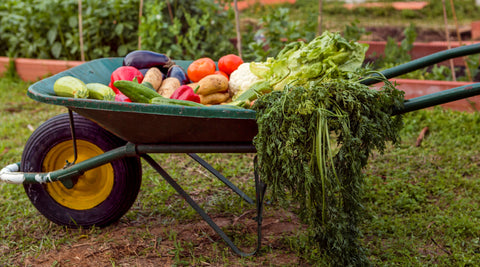
Other Vegetable Options For An Organic Garden At Home:
- Chilli
- Brinjal
- Beans
- Cabbage
- Carrot
- Potato
- Cucumber
- Radish, etc.
What Are The Benefits Of Growing Vegetables Organically?
- Growing vegetables at home is also known as kitchen gardening in the contemporary sense. These veggies will reach your kitchen counter, so you can benefit from the chemical-free approach of growing them.
-
You will not only have more control over what goes into your meals, but the taste will also seem extra delicious, given that they are organically produced.
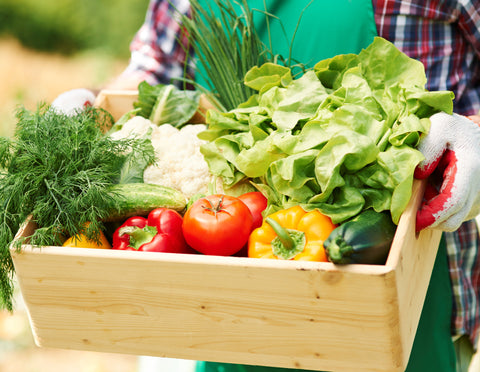
- Kitchen gardening can bring your family closer as all of you indulge in the conscious art of growing your meals together. It may also incite interest in gardening in the young ones.
- Growing vegetables at home is undoubtedly a means to enjoy organic food, but it also benefits the environment in more ways than one.
So, don’t wait up, and begin your organic journey today with the best vegetable seeds on our website! Happy gardening!
FAQs About Growing Organic Vegetables in India
Ques: Are Organic Vegetables More Nutritious?
Ans: Yes, certain studies have demonstrated the increase in antioxidants and flavonoids present in organic vegetables.
Ques: Do Organic Vegetables Last Longer?
Ans: They don’t necessarily last longer, but they do appear fresher than market-bought vegetables due to the lack of chemicals used in their production.
Ques: Can I Grow Organic Vegetables Using A Vegetable Growing Kit?
Ans: Absolutely! Ensure you don’t use any chemical fertilizers or pesticides in the process.
Ques: Is It Hard To Grow Vegetables At Home?
Ans: No, it is not difficult to grow vegetables organically, but they do require a certain amount of attention, care, and love.
Ques: Are Organic Vegetables Tastier?
Ans: Yes, a rich potting mix lends an adequate amount of nutrients to the plants, making the yield rich with nutrients and apt with taste.


